
Doug Kim named to South Carolina 50 Most Influential list
Kim Lahey & Killough Firm Founder Doug Kim named to South Carolina 50 Most Influential list
 Kim Lahey & Killough is proud to announce that its firm founder, Doug Kim, has been named to Integrated Media Publishing’s inaugural list of the Statewide 50 Most Influential People in South Carolina. Honorees were chosen through extensive staff research by the publications group as well as community nominations for their work across the Palmetto State.
Kim Lahey & Killough is proud to announce that its firm founder, Doug Kim, has been named to Integrated Media Publishing’s inaugural list of the Statewide 50 Most Influential People in South Carolina. Honorees were chosen through extensive staff research by the publications group as well as community nominations for their work across the Palmetto State.
A former computer programmer and software engineer, intellectual property attorney Doug Kim has assisted in securing some of the earliest blockchain and AI patents in South Carolina. In addition to his own successful law practice, he has built a law firm that has grown to be South Carolina’s go-to boutique firm for intellectual property matters, providing legal solutions and strategies tailored to each client from start-ups to multinational corporations.
Doug is a leader in the state’s technology ecosystem, most recently serving as Chair of South Carolina’s InnoVision Awards. He is a frequent speaker and trusted authority on AI, technology and intellectual property matters throughout the state.
In addition to this recognition, Doug has previously been named to the South Carolina 500 list by SC Biz; the TALK Greenville Top Lawyers list in the area of Technology Virtual; he has been named by Best Lawyers® as Trademark Lawyer of The Year and Patent Lawyer of The Year for the Greenville metro market; Greenville Business Magazine has named him a Legal Elite of the Upstate; South Carolina Super Lawyers® lists him as a Top Rated Intellectual Property Attorney; and Managing Intellectual Property magazine has previously named him as an “IP Star.”
With offices in both Greenville and Charleston South Carolina, the Kim, Lahey & Killough Law Firm provides strategic legal solutions to businesses of all sizes in the areas of intellectual property creation and protection, brand protection, invention protection, copyright, licensing, intellectual property litigation, trade secrets, software protection, internet and e-commerce issues, corporate formation, contracts, and business disputes and mediation resolutions.

Doug Kim named to SC Biz South Carolina 500 list
Founding attorney Doug Kim named to SC Biz South Carolina 500 list
 Kim Lahey & Killough is pleased to announce that our firm founder Doug Kim has been named to the South Carolina 500 list by SC Biz. The South Carolina 500 is SCBIZ’ first-ever list of The Palmetto State’s most influential and impactful leaders in business, nonprofits, government and higher education. Featured in the December 2025 issue of the publication, South Carolina honorees in law are listed here.
Kim Lahey & Killough is pleased to announce that our firm founder Doug Kim has been named to the South Carolina 500 list by SC Biz. The South Carolina 500 is SCBIZ’ first-ever list of The Palmetto State’s most influential and impactful leaders in business, nonprofits, government and higher education. Featured in the December 2025 issue of the publication, South Carolina honorees in law are listed here.
Doug Kim started his career as a computer engineer after earning his Physics degree at Davidson College. After earning his law degree and working close to two decades as an intellectual property attorney, he founded Kim and Lahey with Seann Lahey in Greenville. The firm, now Kim, Lahey & Killough, has offices in both Greenville and Charleston and was recently honored as South Carolina’s Best Intellectual Property Law Firm by statewide business publications.
In addition to his work as an intellectual property attorney, Doug serves as a South Carolina certified mediator, is a regular speaker and author on topics including intellectual property, artificial intelligence, innovation and their intersection with law. Doug serves as Chair of South Carolina’s InnoVision Awards and previously chaired the South Carolina Bar Technology, Innovation and IP Committee.
With offices in both Greenville and Charleston, SC, Kim, Lahey & Killough Law Firm is devoted to helping clients establish, enforce, and leverage their intellectual property rights from the Upstate to the Lowcountry to across the globe. The firm serves the manufacturing, software, energy, finance, hospitality, tourism, defense, agriculture and technology industries as well as universities. Key practice areas include intellectual property, business and commercial litigation, mediation, employment, corporate and business matters including formation and structure, mergers and acquisitions, contracts, and cybersecurity.

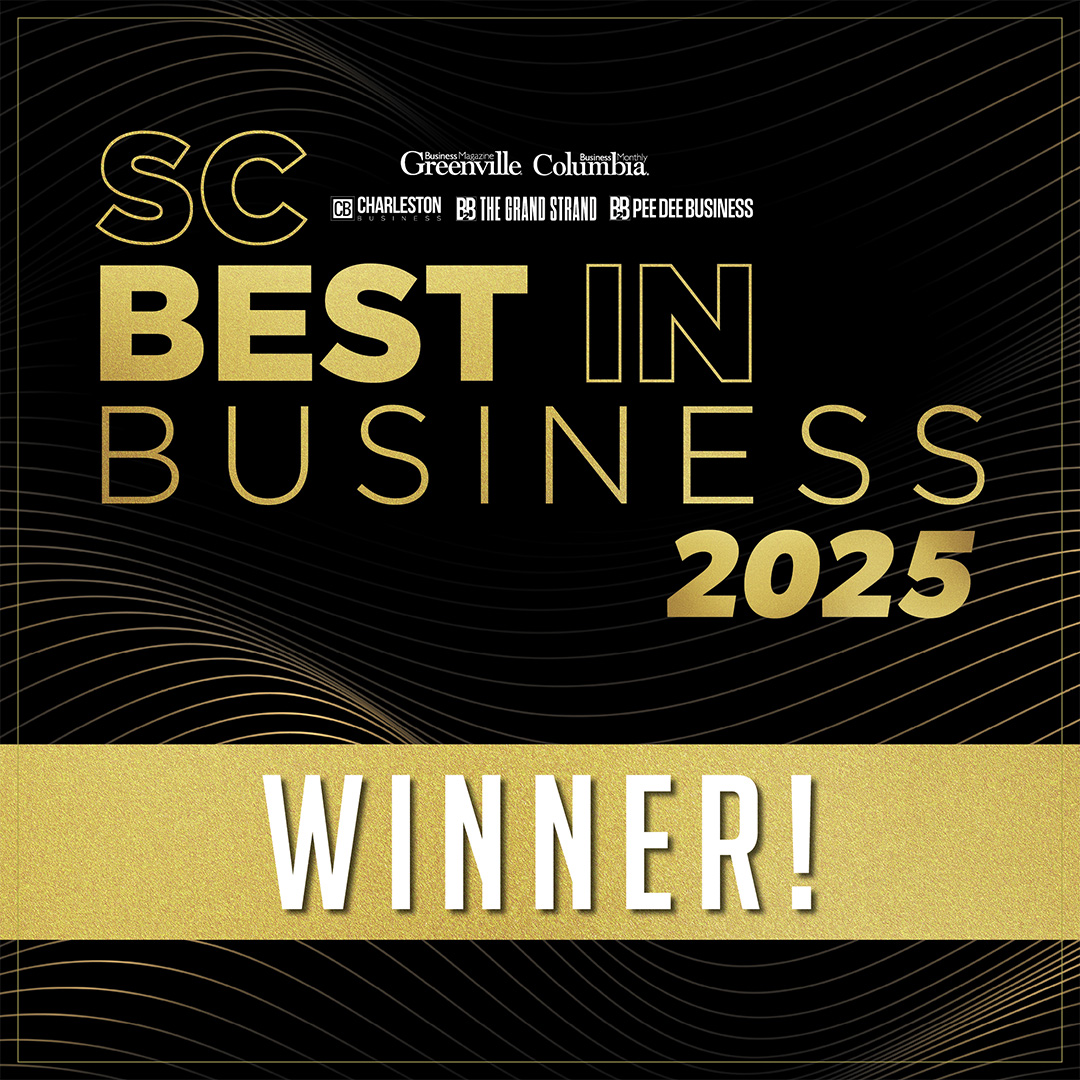
Kim Lahey Killough named Best Intellectual Property Law Firm in South Carolina
Kim, Lahey & Killough Law Firm is proud to announce that we have been named the Best Intellectual Property Law Firm in South Carolina by Greenville Business Magazine, Columbia Business Monthly, Charleston Business Magazine, B2B: The Grand Strand and B2B: Pee Dee Business as part of their Best in Business 2025 initiative. This peer and public voting award was announced in the December 2025 issues of the publications. The firm adds this award to many bestowed in 2025, including:
Kim Lahey Killough named to Best Law Firms
Kim Lahey Killough intellectual property and business attorneys named in Best Lawyers
Kim Lahey Killough attorneys named in South Carolina Super Lawyers
All Kim Lahey Killough attorneys named Legal Elite by Charleston Business Magazine and Greenville Business Magazine
Attorneys named Greenville Top Lawyers by TALK Greenville
We are thankful for the trust and endorsements of our clients, peers, and associates.
With offices in both Greenville and Charleston South Carolina, Kim, Lahey & Killough Law Firm is devoted to helping clients establish, enforce, and leverage their intellectual property rights from the Upstate to the Lowcountry to across the globe. The firm serves the manufacturing, software, energy, finance, hospitality, tourism, defense, agriculture and technology industries as well as universities. Key practice areas include intellectual property, corporate and business matters including formation and structure, mergers and acquisitions, contracts, cybersecurity, franchising, business, commercial and intellectual property litigation, and mediation.

Kim Lahey Killough Listed in 2026 Best Law Firms
Kim, Lahey & Killough Listed in 2026 Best Law Firms
The Kim, Lahey & Killough Law Firm is pleased to be named in the 2026 edition of Best Law Firms® for the Greenville and Charleston, South Carolina markets.
The firm is recognized for its work in the following areas:
Charleston, South Carolina office
- Litigation – Intellectual Property
- Trademark Law
- Business Organizations (including LLCs and Partnerships)
- Corporate Law
Greenville, South Carolina office
- Litigation – Intellectual Property
- Trademark Law
- Copyright Law
- Litigation – Patent
- Commercial Litigation
- Patent Law
With offices in both Greenville and Charleston, SC, Kim, Lahey & Killough Law Firm is devoted to helping clients establish, enforce, and leverage their intellectual property rights from the Upstate to the Lowcountry to across the globe. The firm serves the manufacturing, software, energy, finance, hospitality, tourism, defense, agriculture and technology industries as well as universities. Key practice areas include intellectual property, corporate and business matters including formation and structure, mergers and acquisitions, contracts, cybersecurity, franchising, business, commercial and intellectual property litigation, and mediation.
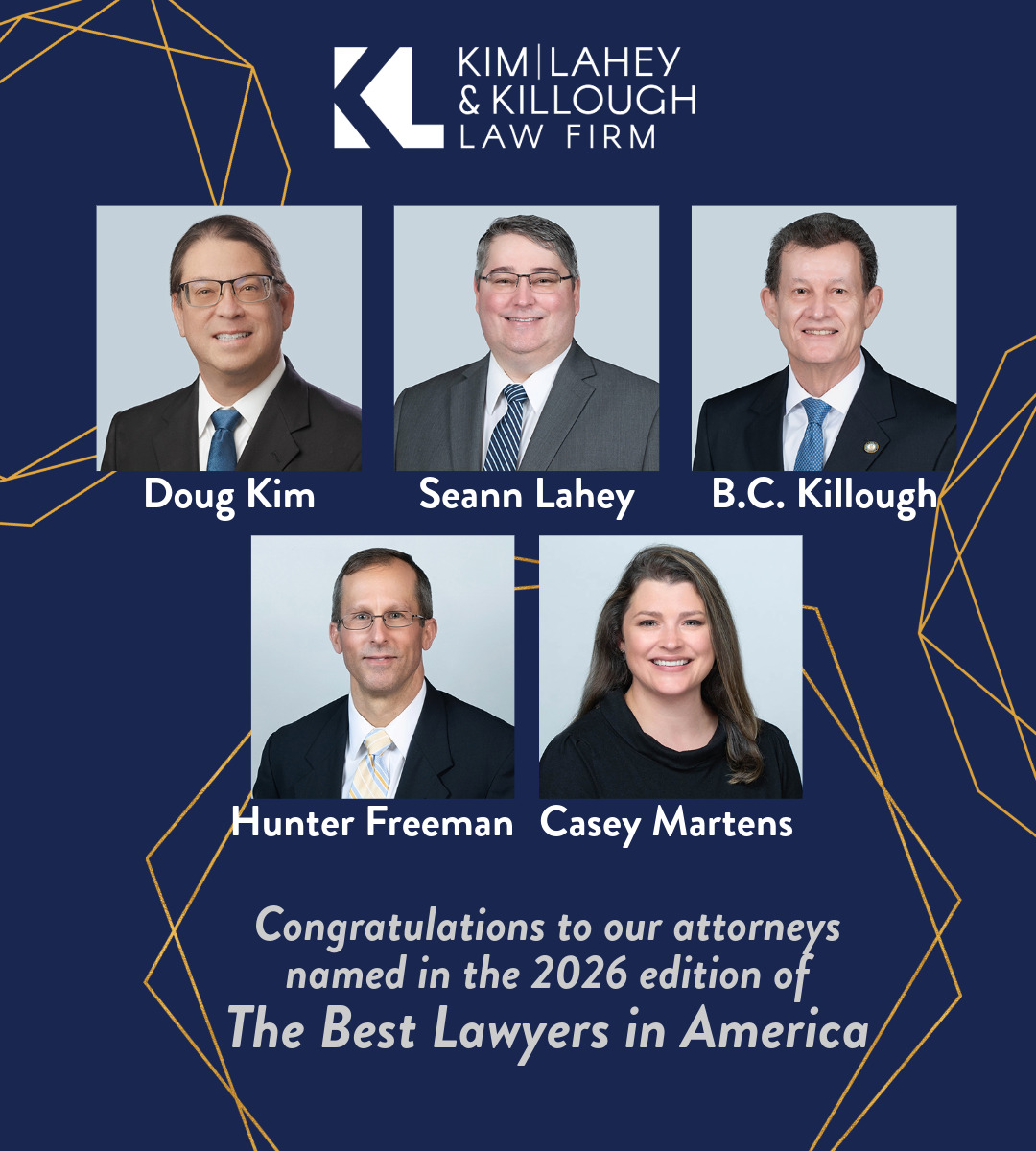
Kim, Lahey Killough attorneys listed 2026 Best Lawyers
Kim, Lahey & Killough attorneys listed in 2026 Best Lawyers
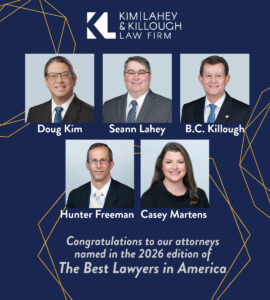 Kim, Lahey & Killough Law Firm is honored to announce that five of the firm attorneys are listed in The Best Lawyers in America® 2026 edition:
Kim, Lahey & Killough Law Firm is honored to announce that five of the firm attorneys are listed in The Best Lawyers in America® 2026 edition:
In the firm’s Greenville home office, firm founder Douglas W. Kim is recognized for his work in
- Litigation – Intellectual Property
- Litigation – Patent
- Patent Law (Lawyer of the Year, 2019)
- Trade Secrets Law
- Trademark Law (Lawyer of the Year, 2022)
Firm co-founder, Seann Lahey is listed for his work in:
- Patent Law
- Trademark Law
And Greenville patent attorney Hunter S. Freeman is commended for his work in:
- Commercial Litigation
- Copyright Law
- Litigation – Intellectual Property
- Litigation – Patent
- Trademark Law
In the firm’s Charleston office, Charleston patent attorney B. C. Killough celebrates his 15th year on the Best Lawyers list for his work in:
- Business Organizations (including LLCs and Partnerships)
- Corporate Law (Lawyer of the Year, 2015)
- Litigation – Intellectual Property
- Patent Law
- Trademark Law
Licensed in South Carolina, North Carolina and Georgia, Casey Martens heads up the firm’s Brevard, NC office. She is recognized by Best Lawyers in the Greenville, SC metro as a 2026 Best Lawyers One to Watch in America in the areas of:
- Employee Benefits Law
- Intellectual Property Law
- Labor and Employment Law – Employee
- Labor and Employment Law – Management
- Litigation – Labor and Employment
Since 1981, The Best Lawyers in America® and Best Lawyers: Ones to Watch® in America has compiled and reviewed peer evaluations from across the United States to identify an annual list of honorees. This year, over 31 million evaluations were analyzed, including a record-breaking 4.8 million new responses.
About Kim, Lahey & Killough
With offices in Greenville and Charleston, SC and Brevard, NC, the Kim, Lahey & Killough Law Firm is devoted to helping clients establish, enforce, and leverage their intellectual property rights from the Upstate, to the Lowcountry to across the globe.
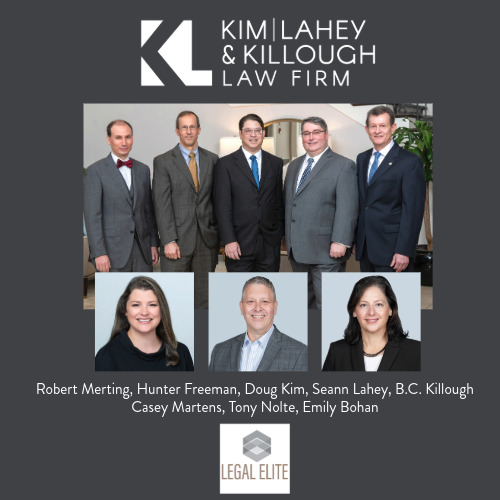
All attorneys listed as 2025 Legal Elite
Entire Kim, Lahey & Killough attorney team listed as 2025 Legal Elite by Charleston Business and Greenville Business Magazines
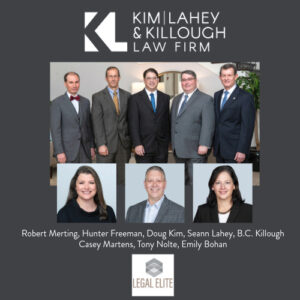 Kim, Lahey & Killough is proud to announce that each of their eight attorneys has been named in the 2025 Legal Elite lists with all five of the firm’s registered patent attorneys recognized as Legal Elite in Intellectual Property and Innovation by Greenville Business Magazine and Charleston Business Magazines. “There are only a select few firms in South Carolina that are boutique intellectual property firms and to have our entire team recognized by our peers in Legal Elite is quite an honor. This recognition confirms the commitment we have to our clients and to providing excellent legal services that help our clients create and protect their intellectual property. This reaffirms our continuing commitment to our clients to assist them with matching legal strategies with their business goals to grow their companies and innovations,” commented firm founder, Doug Kim.
Kim, Lahey & Killough is proud to announce that each of their eight attorneys has been named in the 2025 Legal Elite lists with all five of the firm’s registered patent attorneys recognized as Legal Elite in Intellectual Property and Innovation by Greenville Business Magazine and Charleston Business Magazines. “There are only a select few firms in South Carolina that are boutique intellectual property firms and to have our entire team recognized by our peers in Legal Elite is quite an honor. This recognition confirms the commitment we have to our clients and to providing excellent legal services that help our clients create and protect their intellectual property. This reaffirms our continuing commitment to our clients to assist them with matching legal strategies with their business goals to grow their companies and innovations,” commented firm founder, Doug Kim.
The IP attorneys named Legal Elite include firm founders Doug Kim and Seann Lahey as well as B.C. Killough, Hunter Freeman, and Robert Merting.
In addition to the firm’s core intellectual property practice, the firm supports businesses with corporate counsel. Business attorneys Casey Martens, Anthony Nolte and Emily Bohan were each recognized for their work in corporate matters: Casey was named for her work in Employment Law – Defendants and Emily Bohan was listed for Corporate Law – Business Organization matters.
Greenville business attorney Anthony Nolte rounds out Kim, Lahey & Killough’s whole team of Legal Elite, named for his work in Corporate Law-Merger & Acquisitions. Licensed in both South Carolina and Texas, Tony is a former business and financial executive as well as in-house counsel for Shell, among other successful ventures. He concentrates his legal work in the areas of company structure and formation, start-ups, early-stage and growth companies, corporate governance, mergers, divestitures, and acquisitions, financings, franchising & licensing, contracts, business succession, business disputes & resolutions. Outside of the office, Tony Nolte is an Angel Investor, teaches as an adjunct professor at Furman University, mentors startups in the Greenville ecosystem, serves as a limited partner in the Greenville Next Founders Fund I and is a member of VentureSouth.
The Legal Elite are selected annually through peer nominations from attorneys throughout the state of South Carolina in 50 legal practice areas.
About Kim, Lahey & Killough
With offices in Greenville and Charleston, SC and Brevard, NC, the Kim, Lahey & Killough Law Firm is devoted to helping clients establish, enforce, and leverage their intellectual property rights from the Upstate, to the Lowcountry to across the globe.

Seann Lahey named to GSSM Board
Kim, Lahey & Killough congratulates Greenville registered patent attorney and firm founder Seann Lahey, who has been elected to the South Carolina Governor’s School for Science & Mathematics (GSSM) Foundation board of directors for 2025-2026.
 Seann Lahey is known for his work in STEM fields as an intellectual property attorney. He has extensive experience dealing with international and U.S. patent prosecution, trademarks, copyrights, trade secrets, licensing of intellectual property rights, and rendering legal opinions on validity, infringement and enforceability of intellectual property rights, as well as IP litigation.
Seann Lahey is known for his work in STEM fields as an intellectual property attorney. He has extensive experience dealing with international and U.S. patent prosecution, trademarks, copyrights, trade secrets, licensing of intellectual property rights, and rendering legal opinions on validity, infringement and enforceability of intellectual property rights, as well as IP litigation.
What’s more, Seann is a parent of a recent alum of the GSSM, affording him the ability to advocate for the school from multiple perspectives. “I’m deeply honored to join the Foundation Board of Directors for GSSM,” he commented. “As a parent of a GSSM alum, I can attest to the incredible work and dedication of everyone involved with the school. I look forward to contributing to our shared mission of fostering academic excellence and supporting the brilliant minds of tomorrow.”
Beth Dinndorf, executive director of the GSSM Foundation, added, “We are grateful to the new directors, the new board officers, and all members of the GSSM Foundation Board of Directors for their leadership and commitment to the mission of GSSM and the students it serves. Their collective talents and contributions help GSSM remain the top-ranked public high school in South Carolina, providing an exceptional STEM education to more than 10,000 students in grades 3 through 12 each year.”
About Kim, Lahey & Killough
With offices in Greenville and Charleston, SC and Brevard, NC, the Kim, Lahey & Killough Law Firm is devoted to helping clients establish, enforce, and leverage their intellectual property rights from the Upstate, to the Lowcountry to across the globe. For more information, visit the firm website at kimandlahey.com .
About the South Carolina Governor’s School for Science & Mathematics
 The South Carolina Governor’s School for Science & Mathematics (GSSM) is a nationally ranked top 10 public high school that exists to bring world-class STEM education to students across the state. Founded in 1988 by Gov. Carroll Campbell, GSSM is a state resource that offers a variety of programs including an intensive two-year residential high school, a challenging virtual engineering program, summer camps, and in-school experiences for students in 3rd through 12th grades. The GSSM Foundation advocates for GSSM and provides funds and support to enhance its programs and students’ educational endeavors. Learn more at www.scgssm.org. Read GSSM’s press release announcing the 2025-2026 Board here.
The South Carolina Governor’s School for Science & Mathematics (GSSM) is a nationally ranked top 10 public high school that exists to bring world-class STEM education to students across the state. Founded in 1988 by Gov. Carroll Campbell, GSSM is a state resource that offers a variety of programs including an intensive two-year residential high school, a challenging virtual engineering program, summer camps, and in-school experiences for students in 3rd through 12th grades. The GSSM Foundation advocates for GSSM and provides funds and support to enhance its programs and students’ educational endeavors. Learn more at www.scgssm.org. Read GSSM’s press release announcing the 2025-2026 Board here.

Adopting AI – South Carolina Lawyer
ADOPTING AI: IT’S NOT IF – IT’S HOW
In an article for South Carolina Lawyer, Kim, Lahey & Killough firm founder Doug Kim discusses the risks and rewards of the responsible use of AI for attorneys and law firms. While most in the legal profession bring a cautious approach to the use of AI, this article expounds on the positive benefits of the use of the transformative technology for both attorneys and their clients.
Will AI replace lawyers? No. AI will not replace lawyers but instead will serve as a powerful tool to enhance their capabilities, much like how a high-quality instrument amplifies a professional musician’s training and expertise. AI cannot replace the essential human elements of legal practice. Complex legal matters require nuanced judgment, ethical reasoning, and the personal connection that only human lawyers can provide. AI lacks the ability to make decisions based on empathy, interpret circumstances subjectively, or understand the professional responsibilities that guide legal practice. These human elements remain irreplaceable and essential to effective legal representation.
What AI can do is make lawyers more effective and efficient.
When properly implemented by skilled professionals, AI can automate routine tasks such as legal research, document review, and initial drafting, allowing attorneys to focus on complex strategic work that requires human judgment, ethical reasoning, and personal client relationships.
However, skilled implementation is key as recent court cases involving fabricated AI-generated citations underscore the critical importance of proper training, verification and human oversight.
For clients, responsible AI adoption translates to more efficient service delivery, reduced costs, and higher quality representation, as smaller firms can compete more effectively with larger ones by leveraging technology.
The legal profession is moving toward a future where firms that embrace AI responsibly will provide superior service at competitive rates, while those that resist this evolution risk falling behind.
Ultimately, AI represents not a threat to the legal profession but an opportunity to deliver better outcomes more efficiently, provided it’s implemented with the skill, oversight, and ethical standards that effective legal practice demands.
Read the entire article below, or online here on pages 32-35 and 45 of South Carolina Lawyer.
ADOPTING AI: IT’S NOT IF – IT’S HOW
by Doug Kim for South Carolina Lawyer Magazine, a publication of the South Carolina Bar.
 Last year, Thomson Reuters released a report[1] stating that 82% of lawyers surveyed said AI can be applied to legal work, but only 51% said that it should. That leads to two questions. What can technically do and what are its risks and rewards? Second, how should lawyers use AI? Part 1 of this article addresses the first question. Part 2, which will appear in an upcoming issue of South Carolina Lawyer, provides my views on the latter question.
Last year, Thomson Reuters released a report[1] stating that 82% of lawyers surveyed said AI can be applied to legal work, but only 51% said that it should. That leads to two questions. What can technically do and what are its risks and rewards? Second, how should lawyers use AI? Part 1 of this article addresses the first question. Part 2, which will appear in an upcoming issue of South Carolina Lawyer, provides my views on the latter question.
Circulating among the profession is the fear that AI will just replace lawyers entirely. This is simply not true. Medium and high complex legal tasks require nuanced understanding, interpretation, and application of the law to specific facts, which are skills that AI lacks. AI cannot make judgment calls based on ethical considerations, empathy, and subjective interpretations of circumstances; these human aspects of legal practice cannot be replicated. Further, AI cannot replace the personal connection that lawyers establish with their clients. Importantly, lawyers are bound by rules of professional responsibility, including confidentiality, competent representation, and client advocacy. AI lacks the ability to honor – or indeed even comprehend – these obligations.
If AI will not replace lawyers, then what good is it? AI is a technology that underlies the next generation of tools to be used in the legal profession. Like all tools, the education, experience, and skill of the user makes a dramatic impact on the effectiveness and quality of the work product created with the tool. For example, a professional musician would benefit greatly from the dramatically improved performance of a Jackson Soloist guitar as the Jackson provides better tone, performance, speed and overall playability. A novice would unlikely know the difference and the performance of the novice would not be materially improved.
According to one McKinsey report, skilled users can leverage AI to replace up to 30% of their work, leading to increased efficiency and productivity – the operative work being “skilled.” AI is not a substitute for education, experience or skill. While AI can accelerate education and skill development in the legal process by automating routine tasks and allowing legal professionals to focus on more complex and strategic aspects of their work, it is not a substitute. Without this requisite skill, the AI tool results in little benefit and can even provide a determent.
The real world provides examples of this risk. Just ask the lawyers that, despite clear judicial warnings and sanctions, continue to submit AI-generated court documents with fabricated (also called “hallucinatory”) content. For example, in Kohls v. Ellison, 2025 U.S. Dist. LEXIS 4928 * (D. Minn. Jan. 25, 2025), the expert witness admitted that his declaration inadvertently included citations to two non-existent academic articles, and incorrectly cited the authors of a third article. These errors apparently originated from use of GPT in drafting his declaration and the expert failed to verify these fake citations to academic articles before including them in his declaration.
Indeed, the problem has affected how judges take testimony. In In re Matter of Weber, 2024 NY Slip Op 24258 (N.Y. Surrogates Ct. Oct. 10, 2024), the trial court refused to accept as accurate without more back-up calculations performed by artificial intelligence. The court stated that due to the nature of the rapid evolution of artificial intelligence and its inherent reliability issues, before evidence which has been generated by an artificial intelligence product or system is introduced, counsel has an affirmative duty to disclose the use of artificial intelligence, and the evidence sought to be admitted should properly be subject to an admissibility hearing prior to its admission.
Properly used, AI tools can help lawyers automate manual processes and work more efficiently. For example, when using the AI tool for patent application drafting, more time should be spent at the beginning on the drawings of a patent application and generating a bullet point documents of key features of the invention’s structure and function that are novel and non-obvious (patentability requirements). This shift changes how patent lawyers invest their time, but they do it to more effectively use the AI tool.
Similarly, AI-powered case law research tools can help lawyers more easily find leading case law and guiding legal principles than old-fashioned Boolean searches, but only if lawyers can move away from that conceptual framework. Otherwise, a search term mentality fails to take best advantage of the tool.
Just as important – and unlike traditional computer-aided research – AI can suggest the best language to support arguments. Indeed, AI can also help lawyers quickly produce initial drafts of motions, legal briefs, contracts, and settlement agreements, which in the past have been time intensive. Improper use of AI, however, will cause the output to be either less useful or even counterproductive.
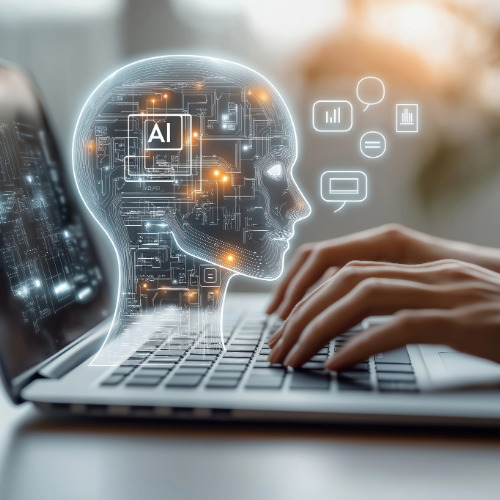 More generally, AI will change how legal services are provided. Routine tasks, such as legal research, document review, and billing can become automated, allowing lawyers to focus on more complex and strategic aspects of their work, especially those that require critical thinking based upon the facts and circumstances of the parties’ case and desired outcome. AI can assist in predicting case outcomes, advising clients, and developing informed strategies. All that requires, however, that lawyers re-order what they do and how they do it. If a lawyer traditionally spends 30% of her time in complex cases reviewing documents, it will require substantial willpower to pivot to a profoundly different allocation of time.
More generally, AI will change how legal services are provided. Routine tasks, such as legal research, document review, and billing can become automated, allowing lawyers to focus on more complex and strategic aspects of their work, especially those that require critical thinking based upon the facts and circumstances of the parties’ case and desired outcome. AI can assist in predicting case outcomes, advising clients, and developing informed strategies. All that requires, however, that lawyers re-order what they do and how they do it. If a lawyer traditionally spends 30% of her time in complex cases reviewing documents, it will require substantial willpower to pivot to a profoundly different allocation of time.
This will also impact the profession as a whole. While not replacing lawyers, AI will create a demand for lawyers with specialized skills in areas that require complex problem-solving, critical thinking, negotiation, and dispute resolution. Substantively, with AI fulfilling some of the more mundane tasks and day-to-day needs, the need for “specialized” areas (e.g., tax, securities, environmental, employment, intellectual property, complex litigation, and the like) will increase. But that also means that lawyers who have made a good living out of routine tasks will face an increasing challenge.
I experienced a movement years ago when I was a computer programmer prior to becoming a lawyer. The same positions were being put forward that AI was going to replace computer engineers. This did not happen. In computer science, AI, especially large language models like Chat-GPT, proved to be just another tool in the toolbox and made experienced programmers more efficient and accurate, enhanced code quality, reduced development costs, reduced time to market, improved quality control and generally made for a better work-product; especially experienced programmers. Properly implemented, AI will do the same for the legal profession. AI will not replace the lawyer.[2] However, attorneys that adopt AI will replace those that do not.
Further, the smaller law firm will become more competitive through leveraging technology just as we saw with online research, communications tools, timekeeping and billing, and practice and case management software. By automating certain tasks, smaller firms can take on more clients without needing additional resources and can maximize profitability while delivering improved legal services to clients. This levels the playing field and allows smaller firms to compete with the larger ones so that the dreaded overhead of the larger firm will become even more of a burden that results in higher fees and less value to the client.
This is not to say that the transition will not be bumpy. While adopting technology eventually reduces overhead and provides more value to clients, the legal profession has always faced challenges when it comes to innovation and technology. Further, most of the bar was licensed prior to the release of the iPhone.[3] This “slow to adopt” challenge stems from the reality of technical competence, or lack thereof, and the resistance to change which stems from being severely risk averse.
In 2017, the Association of Corporate Counsel published A Seat at the Head of the Table: From Lawyer To CEO? and stated, “Risk aversion. Most law firm cultures are built around a strong bias to risk aversion. However, … lawyers must expand their perception from ‘no’ to ‘yes,’ even if the next question is “how?”[4] While this publication was discussing lawyers transitioning to CEOs, it is applicable to the current discussion of whether to “use” AI. It is not a matter of yes or no, but rather when and how. While lawyers didn’t go to law school to be computer programmers, the technical requirements of modern legal practice cannot be ignored.[5] By analogy, the craftsman who used hand tools for many decades may be slow to adopt power tools for the same reasons that lawyers will be slow to adopt AI: habit, inertia, fear of change, inflexibility, etc. Yet history shows that those who adopted power tools surpassed those who did not in short order.
Disruptive technologies are just that – disruptive – and seeing the coming changes and being open to this disruption in the legal industry is critical. Disruption often comes without warning and is not anticipated by the masses. A quote often attributed to Henry Ford is, “If I had asked people what they wanted, they would have said faster horses.” Adapting to disruptive technologies is important to success and potentially the survival of the modern law firm.
AI is growing faster in its development than prior disruptive technologies. This creates both risks which are manageable and opportunities which will further the profession. These risks can be effectively managed with a few simple guiding principles:
- Understand how the AI works, including its training model and limitations.
- Implement AI to a specific application and avoid general, open AI tools.
- Make sure you are always in control of the technology and be accountable for its use (avoid the chatbot).
- Try to only use specific AI that has private, dedicated connections to large language models (as opposed to public data lakes like used by ChatGPT).
- Use AI tools that do not use your input to train with the AI engine and keep input confidential.
- Always have a live person review the content and work product.
The power of AI and the benefits that it can bring will create a separation in the legal profession, split into those that properly adopt AI and those that do not. The split will manifest in lawyers’ ability to deliver higher quality legal services and work product, the faster delivery of work product, and less costs; each of which impact referrals, reputation, and client satisfaction. Reuters reports that clients expect their lawyer to lead the charge in leveraging AI for the client’s benefit.[6] Clients will expect law firms to use AI due to the potential reduction in cost and time savings. The law firm that responds to these demands will have a significant advantage over those that do not. Adopting AI will also lead to changes in billing practices, and we will see more firms move to alternative fee arrangements such as a flat fee billing arrangement.[7]
Doug Kim , a Physics major from Davidson College, began his professional career as a computer programmer and software engineer. His intellectual property career began in 1998 when he combined his business experience with his legal education and was involved with enforcing a client’s patent against multiple infringers. Since then, Doug has created a well-rounded IP practice that provides legal solutions and strategies tailored to each client from multinational corporations to start-ups.
, a Physics major from Davidson College, began his professional career as a computer programmer and software engineer. His intellectual property career began in 1998 when he combined his business experience with his legal education and was involved with enforcing a client’s patent against multiple infringers. Since then, Doug has created a well-rounded IP practice that provides legal solutions and strategies tailored to each client from multinational corporations to start-ups.
[1] New report on ChatGPT & generative AI in law firms shows opportunities abound even as concerns persist, Thomson Reuters, April 17, 2023.
[2] In all fairness, we should see a reduction in the needs for support staff and junior associates. These roles typically involve administrative, repetitive tasks that AI can now perform with greater efficiency and cost effectiveness.
[3] The iPhone was first released June 29, 2007.
[4] A Seat at the Head of the Table: From Lawyer To CEO, by David Felicissimo, Association of Corporate Counsel, 2017.
[5] See CLE requirements in North Carolina for Lawyers, NC Continuing Legal Education (showing that lawyers in North Carolina must complete one hour of CLE in Technology every two years.) https://www.nccle.org/for-lawyers/requirements/renewing-lawyers/
[6] AI: the new legal powerhouse — why lawyers should befriend the machine to stay ahead by Jeremy Glaser and Sharzaad Borna, Thomson Reuters
[7] I appreciate the natural financial friction where the lawyer will pay for AI just to be able to charge less. However, while beyond the scope of this article, AI will have an impact on the adoption of alternative fee arrangements. I have been providing flat fee arrangements for decades and trust me, there is nothing to fear.

Five attorneys named to 2025 Super Lawyers
Five Kim, Lahey & Killough attorneys named in 2025 South Carolina Super Lawyers
 Kim, Lahey & Killough is pleased to announce that five of its attorneys have been recognized in the 2025 edition of South Carolina Super Lawyers, a legal ranking published by Thomson Reuters.
Kim, Lahey & Killough is pleased to announce that five of its attorneys have been recognized in the 2025 edition of South Carolina Super Lawyers, a legal ranking published by Thomson Reuters.
Four patent attorneys with Kim, Lahey & Killough – Doug Kim, Seann Lahey, B.C. Killough and Hunter Freeman – were named among the state’s top-rated intellectual property attorneys. “I am honored to share this recognition with my law partners and am proud that these honors recognize not only individual achievement, but also the depth and strength of our intellectual property team in South Carolina,” commented founding attorney Doug Kim.
Casey Martens has been named in the 2025 South Carolina Rising Stars list as a top-rated employment and labor attorney in the Greenville market – her fifth year earning this recognition.
Super Lawyers recognizes no more than five percent of the lawyers statewide each year, and Rising Stars honors only 2.5 percent of the lawyers in the state. Both lists are compiled by Thomson Reuters, a rating service of outstanding lawyers from more than 70 practice areas who have attained a high degree of peer recognition and professional achievement.
About Kim, Lahey & Killough
With offices in Greenville and Charleston, SC and Brevard, NC, the Kim, Lahey & Killough Law Firm is devoted to helping clients establish, enforce, and leverage their intellectual property rights from the Upstate, to the Lowcountry to across the globe.
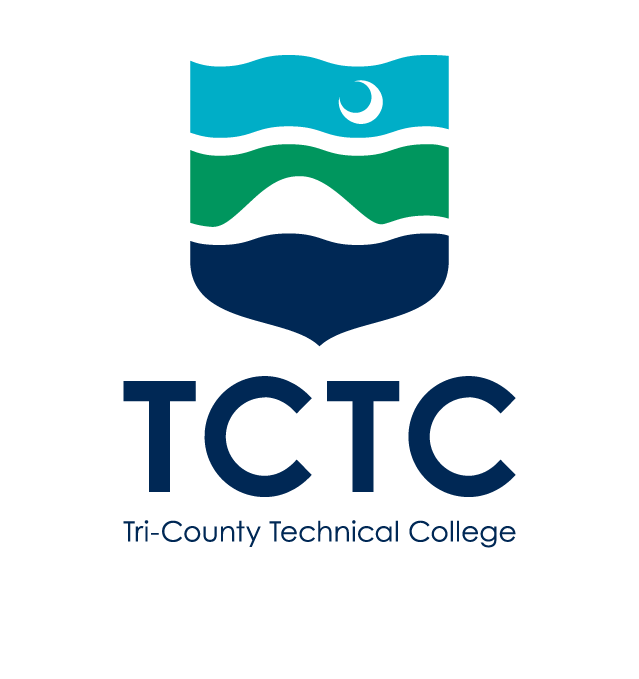
2025 Paralegal scholarship awarded
Kim, Lahey & Killough Law Firm congratulates Madison Gilstrap, the winner of our annual Paralegal Scholarship with Tri-County Technical College Foundation. This merit scholarship is awarded to a student who demonstrates academic excellence, dedication and passion for the legal profession. Ms. Gilstrap has shared that this scholarship will allow her to take her remaining classes in order to graduate this Spring semester.
Tri-County Technical College is a public, two-year community and technical college serving Anderson, Oconee and Pickens counties in South Carolina and is accredited by the Southern Association of Colleges and Schools Commission on Colleges (SACSCOC). The Criminal Justice, Paralegal Emphasis program at TCTC is an associate degree program offered both at the Pendleton Campus and online. The College advances economic development in the tri-county region by preparing a highly skilled workforce.
Kim, Lahey & Killough is committed to supporting education in our community and are proud to invest in the next generation of legal professionals. With offices in Greenville and Charleston, SC and Brevard, NC, the Kim, Lahey & Killough Law Firm is devoted to helping clients establish, enforce, and leverage their intellectual property rights from the Upstate, to the Lowcountry to across the globe. For more information, visit the firm website at kimandlahey.com.

